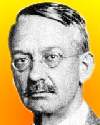 (source)
(source)
|
Edwin Grant Conklin
(24 Nov 1863 - 21 Nov 1952)
American biologist and embryologist who elucidated the role of the cytoplasm of the egg in the early differentiation of the embryo. He lectured widely, interpreting evolution to religious and lay groups.
|
Science Quotes by Edwin Grant Conklin (10 quotes)
Apparently the anti-evolutionist expects to see a monkey or an ass transformed into a man, though he must be familiar enough with the reverse process.
— Edwin Grant Conklin
As quoted by E. Newton Harvey, in 'Edwin Grant Conklin: A Biographical Memoir', Biographical Memoirs of the National Academy of Sciences(1958), Vol. 31, 59.

Dictators seek to control men’s thoughts as well as their bodies and so they attempt to dictate science, education and religion. But dictated education is usually propaganda, dictated history is often mythology, dictated science is pseudo-science.
— Edwin Grant Conklin
From Address as retiring president before the American Association for the Advancement of Science, Indianapolis (27 Dec 1937). Published in 'Science and Ethics', Science (31 Dec 1937), 86, No. 2244, 601.
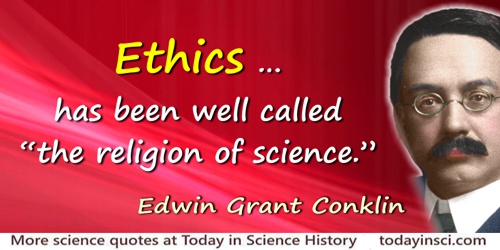
Ethics … has been well called “the religion of science.”
— Edwin Grant Conklin
From Address as retiring president before the American Association for the Advancement of Science, Indianapolis (27 Dec 1937). Published in 'Science and Ethics', Science (31 Dec 1937), 86, No. 2244, 596.
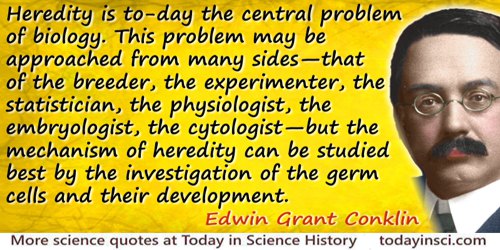
Heredity is to-day the central problem of biology. This problem may be approached from many sides—that of the breeder, the experimenter, the statistician, the physiologist, the embryologist, the cytologist—but the mechanism of heredity can be studied best by the investigation of the germ cells and their development.
— Edwin Grant Conklin
From Address of the vice-president and chairman of Section F, Zoology, American Association for the Advancement of Science, Chicago Meeting (1907-8). Published in 'The Mechanism of Heredity', Science (17 Jan 1908), 27, No. 691, 89-90.
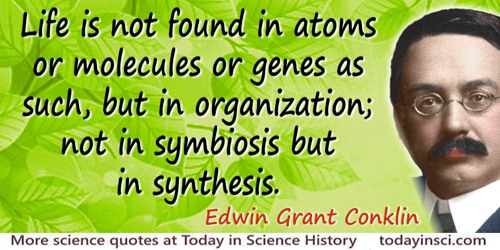
Life is not found in atoms or molecules or genes as such, but in organization; not in symbiosis but in synthesis.
— Edwin Grant Conklin
In 'Cell and Protoplasm Concepts: Historical Account', The Cell and the Protoplasm: Publication of the American Association of Science (1940), No. 114, 18.
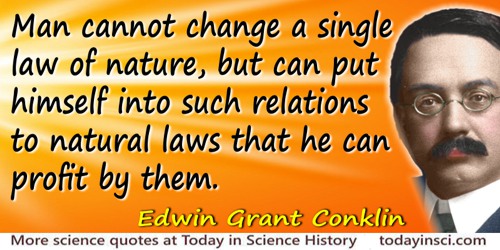
Man cannot change a single law of nature, but can put himself into such relations to natural laws that he can profit by them.
— Edwin Grant Conklin
In Heredity and Environment in the Development of Men (1920), 275.
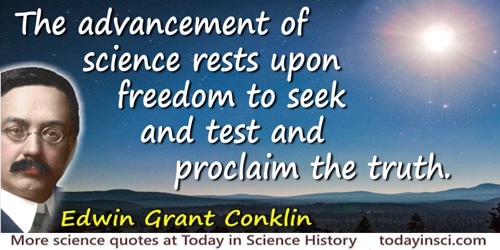
The advancement of science rests upon freedom to seek and test and proclaim the truth.
— Edwin Grant Conklin
From Address as retiring president before the American Association for the Advancement of Science, Indianapolis (27 Dec 1937). Published in 'Science and Ethics', Science (31 Dec 1937), 86, No. 2244, 601.
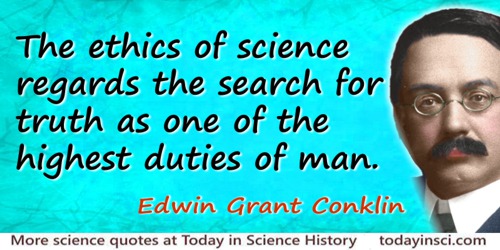
The ethics of science regards the search for truth as one of the highest duties of man; it regards noble human character as the finest product of evolution; it considers the service of all mankind as the universal good; it teaches that human nature and humane nurture may be improved, that reason may replace unreason, cooperation supplement competition, and the progress of the human race through future ages be promoted by intelligence and goodwill.
— Edwin Grant Conklin
From Address as retiring president before the American Association for the Advancement of Science, Indianapolis (27 Dec 1937). Published in 'Science and Ethics', Science (31 Dec 1937), 86, No. 2244, 602.
What molecules and atoms and electrons are to the physicist and chemist, chromosomes and genes are to the biologist.
— Edwin Grant Conklin
From Penrose Memorial Lecture to the American Philosophical Society, Philadelphia (20 Apr 1934), published as 'A Generation's Progress in the Study of Evolution', Science (17 Aug 1934), 80, No 2068, 151.
Wooden legs are not inherited, although wooden heads may be.
— Edwin Grant Conklin
On the view that acquired characteristics can be inherited. As quoted by E. Newton Harvey, in 'Edwin Grant Conklin: A Biographical Memoir', Biographical Memoirs of the National Academy of Sciences(1958), Vol. 31, 59.
See also:
- 24 Nov - short biography, births, deaths and events on date of Conklin's birth.
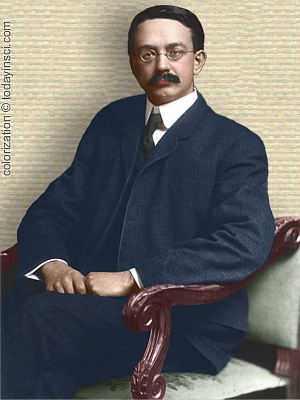
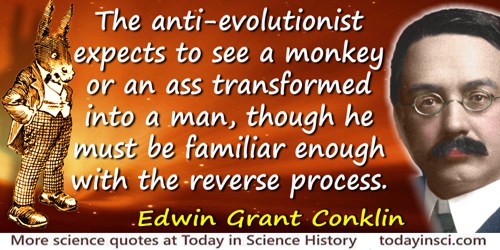
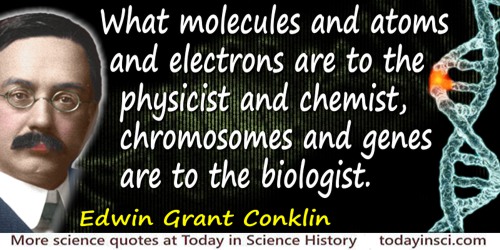
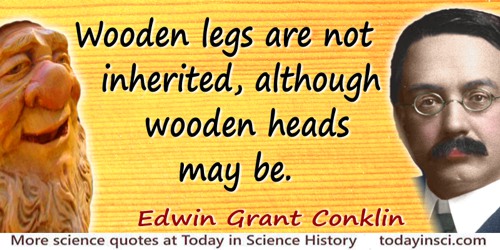
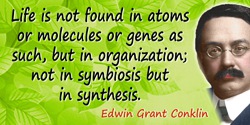


 In science it often happens that scientists say, 'You know that's a really good argument; my position is mistaken,' and then they would actually change their minds and you never hear that old view from them again. They really do it. It doesn't happen as often as it should, because scientists are human and change is sometimes painful. But it happens every day. I cannot recall the last time something like that happened in politics or religion.
(1987) --
In science it often happens that scientists say, 'You know that's a really good argument; my position is mistaken,' and then they would actually change their minds and you never hear that old view from them again. They really do it. It doesn't happen as often as it should, because scientists are human and change is sometimes painful. But it happens every day. I cannot recall the last time something like that happened in politics or religion.
(1987) -- 


